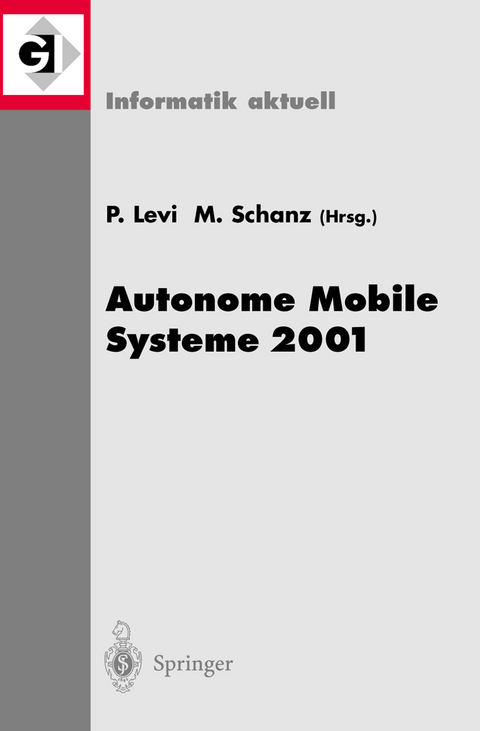
Autonome Mobile Systeme 2001
Springer Berlin (Verlag)
978-3-540-42552-6 (ISBN)
Ziel dieser Fachgespräche ist, Wissenschaftlern aus Forschung und Industrie, die auf dem Gebiet der autonomen mobilen Systeme arbeiten, eine Basis für den Gedanken- und Ideenaustausch zu bieten und wissenschaftliche Diskussionen sowie Kooperationen auf diesem Forschungsgebiet zu fördern.
Paul Levi is Full Professor for Informatics in the Institute for Parallel and Distributed Systems of the University of Stuttgart, Germany. He graduated in physics and computer science and became a senior research scientist in informatics and robotics, and Head of the Department of Technical Expert Systems and Robotics at the University of Karlsruhe. In 1988 he was appointed Professor at the Technical University of Munich, and scientific member of the Bavarian Center for Knowledge-Based Systems. Later on he served as Director of the Institute for Parallel and Distributed High Performance Computers at the University of Stuttgart. He is Member of the Management Board of the Centre for Computer Science (FZI) and Director of the Division Intelligent Systems and Production Engineering (ISPE), Karlsruhe, Germany. Paul Levi's main research fields include computer vision, robotics, distributed AI and multi-agent systems. He has authored and co-authored both textbooks and monographs.
Michael Schanz ist Jurist und verantwortlich für das Veranstaltungsmanagement der PWG-Seminar. Themenschwerpunkte sind Fragestellungen im Gesundheitswesen, vor allem arbeitsrechtliche Themen.
Bildverarbeitung für mobile Systeme.- Object Recognition and Estimation of Camera Orientation for Walking Machines.- 3D-Kartierung durch fortlaufende Registrierung und Verschmelzung hochgradig reduzierter Teilkarten.- 3D-Visual Servoing zur autonomen Navigation einer nichtholonomen mobilen Plattform.- Optische Navigation für den assistierten Betrieb eines Rollstuhls.- Simultaneous Segmentation, Object Recognition, 3D Localization and Tracking Using Stereo.- RoboCup.- Modellbasierter integrierter Entwurfsprozeß für autonome, mobile Roboterteams.- Bildverarbeitungsbasierte Selbstlokalisation in einer RoboCup-Umgebung.- Control of Autonomous Robots in the RoboCup Scenario Using Coupled Selection Equations.- Autonome und kooperative Systeme.- Collision Avoidance for Cooperating Cleaning Robots.- Generating Complex Driving Behavior by Means of Neural Fields.- Object Recognition with Multiple Observers.- Manipulation und Messung.- Autonome mobile Systeme auf dem Weg zur CE-Zertifizierung am Beispiel eines Messroboters.- A Vision-Guided Robot for Manipulation of Domino Tokens.- Kollisionserkennung und -Vermeidung für einen mobilen Manipulator.- Anwendungen autonomer mobiler Systeme.- Multimodale Mensch-Maschine-Interaktion für Servicerobotik-Systeme.- Reaktive Navigation eines intelligenten Gehhilferoboters.- Shared Autonomy for Wheel Chair Control: Attempts to Assess the User's Autonomy.- Das Rasterelektronenmikroskop als Sensorsystem für die Automation mobiler Mikroroboter.- Demonstration von Bildverarbeitung und Sprachverstehen in der Dienstleistungsrobotik.- Navigation und Lokalisation.- Berechnung der zeitoptimalen Bewegung von Robotersystemen: Direkte Methode.- Selbstlokalisation in Routengraphen.- Aufbau topologischer Karten und schnelle globale Bahnplanungfür mobile Roboter.- Konsistente Karten aus Laserscans.- Absolute Lokalisation mobiler Roboter durch Codierungen mit künstlichen Landmarken.- Bestimmung eines kürzesten Weges unter Berücksichtigung der Benutzerintention.- Autorenverzeichnis.
| Erscheint lt. Verlag | 26.9.2001 |
|---|---|
| Reihe/Serie | Informatik aktuell |
| Zusatzinfo | IX, 193 S. 81 Abb. |
| Verlagsort | Berlin |
| Sprache | deutsch |
| Maße | 155 x 235 mm |
| Gewicht | 317 g |
| Themenwelt | Informatik ► Theorie / Studium ► Künstliche Intelligenz / Robotik |
| Technik ► Elektrotechnik / Energietechnik | |
| Technik ► Maschinenbau | |
| Schlagworte | Aktorik • algebraic complexity theory • Automatisierungstechnik • Autonome mobile Systeme • Autonome Roboter • Complexity • Computational Complexity • Innovation • Kognition • Künstliche Intelligenz • Navigation • np-completeness • Rechnersysteme • RoboCup • Roboter • Selbstlokalisation • Sensorfunsion • Sensorik • Servicerobotik |
| ISBN-10 | 3-540-42552-7 / 3540425527 |
| ISBN-13 | 978-3-540-42552-6 / 9783540425526 |
| Zustand | Neuware |
| Haben Sie eine Frage zum Produkt? |
aus dem Bereich


